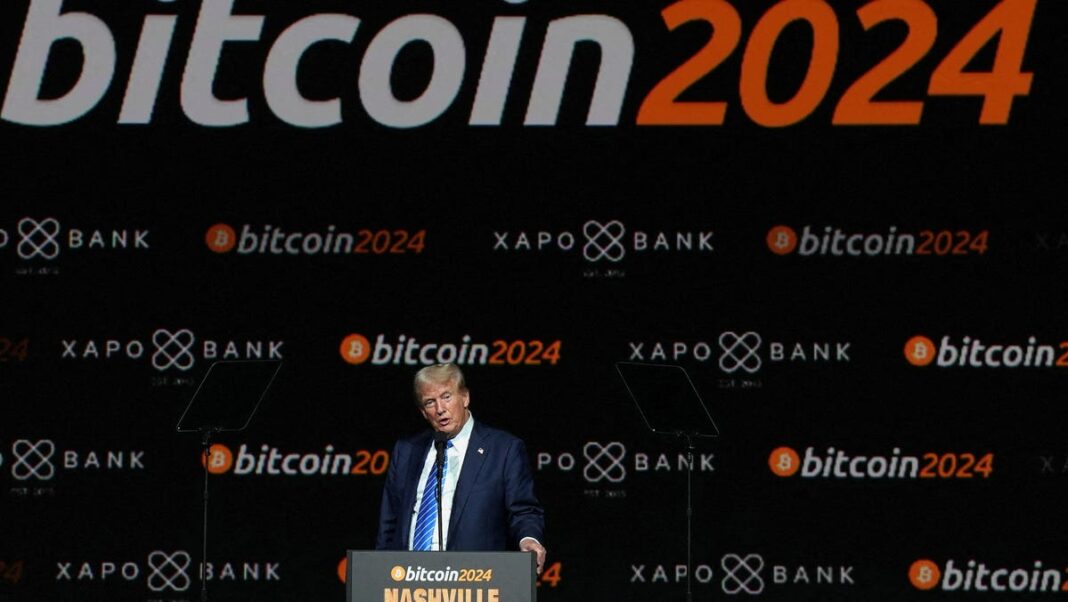Trump Plans to Establish a Bitcoin Strategic Reserve: How Would It Function?
This year, Bitcoin prices have surged, partially driven by President-elect Donald Trump’s promise to build a government that supports cryptocurrencies—this includes the intention to accumulate the fluctuating digital currency.
During a conference in July, Trump articulated that retaining Bitcoin for the nation would serve as “a permanent national asset that benefits all Americans” and enhance the United States’ influence in the global cryptocurrency market. Some advocates are urging the new administration to establish a bitcoin strategic reserve, arguing that increasing the nation’s cryptocurrency assets would aid in reducing the national debt.
Let’s delve into what we know about Trump’s vision for this crypto reserve and its implications for taxpayers.
Understanding How a Bitcoin Reserve Would Function
The United States has nearly $20 billion in Bitcoin acquired through legal seizures, as reported by the crypto analytics firm Arkham Intelligence.
While federal authorities occasionally sell some of this cryptocurrency, Trump has shown a desire to stop any future sell-offs to develop a stable “core” stockpile of Bitcoin.
“Our government has long broken the fundamental principle that every Bitcoin enthusiast knows: Never sell your Bitcoin,” Trump stated in July.
As of now, Bitcoin’s value has risen over 100% this year. By refraining from selling off Bitcoin, the U.S. could maintain higher prices, which would be advantageous for existing investors.
“If you limit supply in the overall, live market, it helps prevent price suppression,” explained Seoyoung Kim, a finance associate professor at Santa Clara University and author of “DeFi For Dummies.”
Nevertheless, some experts contend that merely holding onto existing cryptocurrency isn’t sufficient, and they advocate for a Bitcoin strategic reserve akin to the reserves of gold and oil maintained by the U.S. government.
This year, Republican Senator Cynthia Lummis from Wyoming proposed a bill to gradually acquire 1 million Bitcoin, which would represent about 5% of all Bitcoin in circulation, intending to hold it for a minimum of 20 years. The funding for this acquisition would come from revaluing approximately $11 billion in gold certificates found on the Federal Reserve’s balance sheet.
Lummis asserted that a Bitcoin reserve could assist in reducing the U.S. national debt, which currently stands at $36 trillion, and bolster the dollar.
“Despite potential short-term price fluctuations, a Bitcoin reserve like this would provide a significant and stable store of value in the long run,” Lummis wrote in a letter to the Wall Street Journal.
Trump emphasized that a Bitcoin reserve would enable the U.S. to compete effectively with other nations in the cryptocurrency realm.
“We aim to achieve great things with crypto because we don’t want China or anybody else—not just China, but other nations that are adopting it as well—getting ahead, and we want to lead,” Trump remarked to CNBC earlier this month.
As of Thursday, other nations holding significant Bitcoin assets include China ($18.5 billion), the United Kingdom ($6 billion), Ukraine ($4.5 billion), Bhutan ($1 billion), and El Salvador ($582 million), according to the BitcoinTreasuries data site.
However, some cryptocurrency professionals argue that the U.S. can maintain its competitive edge without needing a strategic reserve.
“I believe that regulatory clarity for all digital assets moving forward would be more beneficial for the U.S. economy than holding a volatile asset in reserve,” stated Michele Neitz, a visiting professor at the University of San Francisco and founding director of the Center for Law, Tech, and Social Good.
What are the Risks Involved with a Federal Bitcoin Reserve?
According to Owen Lau, a senior analyst at Oppenheimer & Co., establishing a stockpile could be relatively straightforward for the president;
The possibility of selling off its bitcoin has been put on pause. However, establishing a strategic reserve would probably require approval from Congress, which is seen as unlikely.
“I haven’t encountered sufficient backing for the idea of creating such a reserve,” he mentioned. “If we were to take the concept of a stockpile further and start actively buying and selling bitcoin, that would carry considerable risk and be challenging to explain to the public.”
There are worries about the vulnerability of crypto wallets to cyberattacks and the risk of bitcoin’s value declining. While the cryptocurrency is currently near its all-time highs, it has experienced significant drops in the past, such as a decline of over 70% from November 2021 to November 2022.
“When bitcoin goes up, it benefits us. If it falls, taxpayers will bear the loss,” Lau explained.
A recent analysis by Barclays suggested that creating a bitcoin strategic reserve would probably necessitate issuing new Treasury debt, according to reports from Reuters. The bank warns that such a proposal is likely to meet significant opposition from the Federal Reserve.
During a press conference on Wednesday, Fed Chair Jerome Powell was asked about the potential for a bitcoin reserve and stated that the central bank has no intention of holding bitcoin.
“We are not permitted to own bitcoin. The Federal Reserve Act outlines our allowable assets, and we are not seeking to change that law,” Powell commented. “If this is something to consider, it would be up to Congress, but we are not pursuing any legal changes at the Fed.”

